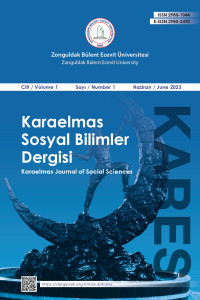Vergi Yükü Üzerine Literatür İncelemesi
Vergi yükü, günümüze değin önemini koruyan ve literatürde de genellikle objektif yönü ele alındığından subjektif yönünün hala eksik olduğu görülen bir konudur. Uluslararası literatürden 1930’lu yıllardan bu yana vergi yükü konusuna önem verilmeye başlandığı ve günümüzde de son yıllarda yapılan çalışmalarla konuya verilen öneminin devam ettiği görülmektedir. Bu çalışmanın amacını, vergi yükü ile ilgili mevcut literatürün incelenmesi oluşturmaktadır. Bu bağlamda çalışmanın araştırmacılar için literatürdeki boşluğa dikkat çekmek ve yeni araştırmalara yön göstermek oluşturmaktadır. Ulusal ve uluslararası literatür incelemesinden anlaşıldığı üzere 1930’lu yıllardan bugüne alanda yapılan teorik ve ampirik çalışmaların vergi yükünün genellikle kolay hesaplanabilir olmasından dolayı objektif yönünü ele aldığı subjektif yönünü ele alan ise çok az çalışma olduğu görülmektedir. Vergi yükü terimi için literatürde tam bir fikir birliği olmasa da genellikle “tax burden” teriminin kullanıldığı görüldüğünden çalışmada bu vergi yükü terimi kullanılmıştır. Vergi yükü kullanıldığı alana göre değişmekle birlikte kavram teorik olarak objektif ve subjektif vergi yükü olarak iki yönüyle ele alınmıştır. Objektif vergi yükü toplam vergi yükü, kişisel vergi yükü, bölgesel vergi yükü, sektörel vergi yükünü ifade ederken subjektif vergi yükü ise bireyler üzerindeki psikolojik baskıyı ifade etmektedir. Ulusal ve uluslararası literatür ise objektif ve subjektif vergi yükü olmak üzere iki ayrı yönüyle ele alınmış subjektif vergi yükü üzerine çalışmaların az olduğu ve genellikle teorik ya da dar kapsamlı bir çerçeve sunduğu görülmüştür. Ancak son yıllarda subjektif vergi yüküne verilen önemin arttığı ve daha kapsamlı, karma yöntemli, sadece teorik olmayan karmaşık ilişkilerin ortaya çıkarılmasına katkı sunan modeller ile incelenmeye başlandığı görülse de yeterli düzeyde olmadığı ve daha fazla araştırmaya ihtiyaç olduğu görülmektedir.
Anahtar Kelimeler:
objektif vergi yükü, subjektif vergi yükü, algılamak, vergi yükü, literatür
LITERATURE REVIEW ON TAX BURDEN
The tax burden is a subject that has remained important until today and is still lacking in its subjective aspect, since its objective aspect is generally considered in the literature. From the international literature, it is seen that the tax burden has started to be given importance since the 1930s, and today, the importance given to the subject by the studies carried out in recent years continues. The aim of this study is to examine the existing literature on tax burden. In this context, the aim of the study is to draw attention to the gap in the literature for researchers and to guide new research. As it is understood from the national and international literature review, it is seen that there are very few studies that deal with the subjective aspect of the theoretical and empirical studies conducted in the field since the 1930s, since the tax burden is generally easily calculated. Although there is no complete consensus in the literature for the term tax burden, this tax burden term was used in the study since it is seen that the term "tax burden" is generally used. Although the tax burden varies according to the field in which it is used, the concept has been theoretically discussed in two aspects as objective and subjective tax burden. While the objective tax burden expresses the total tax burden, the personal tax burden, the regional tax burden and the sectoral tax burden, the subjective tax burden expresses the psychological pressure of the tax burden on individuals. National and international literature, on the other hand, has been dealt with in two different aspects as objective and subjective tax burden. However, although it is seen that the importance given to the subjective tax burden has increased in recent years and it has started to be examined with more comprehensive, mixed-method models that contribute to revealing complex relationships that are not only theoretical, it is seen that it is not at a sufficient level and more research is needed.
Keywords:
objective tax burden, subjective tax burden, perceptıon, tax burden, literature,
___
- Akdoğan Abdurrahman, Kamu Maliyesi Gözden Geçirilmiş ve Genişletilmiş, Ankara, Gazi Kitabevi, 2017. Aktan Coşkun C. - Hilmi Çoban, Vergileme Ekonomisi ve Vergileme Psikolojisi Perspektiflerinden Vergiye Karşı Tutum ve Davranışları Belirleyen Faktörler, Vergileme Ekonomisi ve Vergileme Psikolojisi, (Der.: Coşkun Can Aktan, Dilek Dileyici ve İstiklal Y. Vural), Seçkin Yayınevi, Ankara, 2006. Demir İhsan Cemil, Türkiye’de Vergi Yükü (Objektif ve Subjektif Yönleriyle), Afyonkarahisar, Dora Basım Yayın Dağıtım, 2013. Edizdoğan Nihat vd., Kamu Maliyesi, Bursa, Ekin Basım Yayın Dağıtım, 2010.
- ISSN: 2980-1044
- Başlangıç: 2023
- Yayıncı: Zonguldak Bülent Ecevit Üniversitesi
Sayıdaki Diğer Makaleler
Memlûklerde Toprak Yönetimi ve İktâʿ
Özbek Kimliğinin Oluşum Süreci ve Lakaylar
Nurettin HATUNOĞLU, Görkem TOMARCA
Oralkhan Bökey’in Eserlerinde Altaylar Doğası
Assem NURLANOVA, Akerke JAMSAP
Yaşar Nabi Nayır’ın Tiyatro Kurumlarına Dair Yazılarına Toplu Bir Bakış
Vergi Yükü Üzerine Literatür İncelemesi
İslamofobi Oluşumunda İslam Dünyasının Sorumluluğu Üzerine Öz Eleştirel Yaklaşım
Örgütsel Çatışma Türleri ve Çatışmanın Örgüt Açısından Olumlu ve Olumsuz Etkileri
